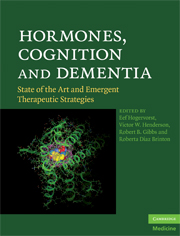Book contents
- Hormones, Cognition and Dementia
- Hormones, Cognition and Dementia
- Copyright page
- Contents
- Contributors
- Preface
- Section 1 Estrogens and cognition: perspectives and opportunities in the wake of the Women's Health Initiative Memory Study
- Section 2 Varieties of estrogenic therapy
- Section 3 Potential modulators and modifiers of estrogenic effects
- Chapter 11 Progesterone regulation of neuroprotective estrogen actions
- Chapter 12 Clinical data of estrogen's effects in the central nervous system: estrogen and mood
- Chapter 13 Different forms of soy processing may determine the positive or negative impact on cognitive function of Indonesian elderly
- Chapter 14 Hypothalamus-pituitary-adrenal axis activity in aging women: its impact on the brain and the potential influence of estradiol
- Section 4 Possible genetic factors related to hormone treatment effects
- Section 5 Testosterone, estradiol and men, and sex hormone binding globulin
- Section 6 Gonadotropin effects
- Index
- Plate Section
Chapter 13 - Different forms of soy processing may determine the positive or negative impact on cognitive function of Indonesian elderly
from Section 3 - Potential modulators and modifiers of estrogenic effects
Published online by Cambridge University Press: 06 July 2010
- Hormones, Cognition and Dementia
- Hormones, Cognition and Dementia
- Copyright page
- Contents
- Contributors
- Preface
- Section 1 Estrogens and cognition: perspectives and opportunities in the wake of the Women's Health Initiative Memory Study
- Section 2 Varieties of estrogenic therapy
- Section 3 Potential modulators and modifiers of estrogenic effects
- Chapter 11 Progesterone regulation of neuroprotective estrogen actions
- Chapter 12 Clinical data of estrogen's effects in the central nervous system: estrogen and mood
- Chapter 13 Different forms of soy processing may determine the positive or negative impact on cognitive function of Indonesian elderly
- Chapter 14 Hypothalamus-pituitary-adrenal axis activity in aging women: its impact on the brain and the potential influence of estradiol
- Section 4 Possible genetic factors related to hormone treatment effects
- Section 5 Testosterone, estradiol and men, and sex hormone binding globulin
- Section 6 Gonadotropin effects
- Index
- Plate Section
Summary
Hogervorst and colleagues review the complex topic of soy effects on cognition and risk of dementia. In an attempt to address one aspect of this complexity, they conducted a comparative analysis of fermented (e.g., tempe) versus non-fermented (e.g., tofu) forms. Results of their analyses indicate that high intake of tofu was associated with lower cognitive function and an increased risk for dementia, particularly in those participants who were older than 68 years of age. These findings are consistent with previous analyses of hormone therapy and tofu consumption. They also found a complex association with genistein levels. Relatively younger participants (52–68 years of age) appeared to have optimal genistein levels relating to optimal memory function, whereas persons older than 68 years of age with high genistein levels exhibited lower cognitive performance and an increased risk of dementia. These results are reminiscent of the window of opportunity theory (Chapters 4 and 5) or the healthy cell bias theory (Chapter 6). Higher folate levels within tempe (which contains high phytoestrogen levels) may be a mediating factor for its reported protective effects. Further studies to determine the interaction between serum phytoestrogens and folate levels and their relationship to dementia risk are suggested.
- Type
- Chapter
- Information
- Hormones, Cognition and DementiaState of the Art and Emergent Therapeutic Strategies, pp. 121 - 132Publisher: Cambridge University PressPrint publication year: 2009
- 2
- Cited by

